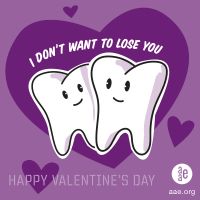Matters of Head, Heart and Oral Health
 Arguably the sweetest month of the year, February is Healthy Heart Month. Not surprising — as doilies and Valentines abound, the universal shape of affection reminds us to love ourselves enough to care for our hearts. Ask anyone what they might do to take better care of their heart, and they may suggest cutting back on cholesterol. Lowering blood pressure. Exercising more. All very important, but do your patients know they can also show their hearts some love by taking better care of their oral health?
Arguably the sweetest month of the year, February is Healthy Heart Month. Not surprising — as doilies and Valentines abound, the universal shape of affection reminds us to love ourselves enough to care for our hearts. Ask anyone what they might do to take better care of their heart, and they may suggest cutting back on cholesterol. Lowering blood pressure. Exercising more. All very important, but do your patients know they can also show their hearts some love by taking better care of their oral health?
The AAE’s recent public survey found that a whopping 77 percent of the public does not realize that poor oral health could be linked to heart attack; and 80 percent doesn’t realize poor oral health could be linked to stroke.
What’s more: New research shared by the American Heart Association indicates that markers of bad oral health — including missing teeth and plaque buildup — are indeed associated with an increased risk of stroke. The preliminary research is being presented this month at the American Stroke Association’s International Stroke Conference in Dallas. The researchers say their study adds to the current body of knowledge surrounding the link between poor oral health and negative health outcomes elsewhere in the body.
Research like this underscores the importance of root canal treatment and saving teeth. And there’s no one better equipped to save teeth than an endodontist.
For Patients
Because It’s Almost Valentine’s Day…
We see those hard candy conversation hearts. Here are five things patients ought to know about cracked teeth:
1. How does one crack a tooth?
A crack can occur from injury or general wear and tear caused by grinding or clenching ones’ teeth – a symptom of stress. While cracked teeth are not completely preventable, you can take some steps to make your teeth less susceptible to cracks by not chewing on hard objects such as ice, unpopped popcorn kernels or pens. Protective mouth wear, such as a mouthguard, can also be worn to mitigate the damage teeth grinding can cause.
2. How will I know if my tooth is cracked?
Cracked teeth show a variety of symptoms, including unpredictable severe pain when chewing, or pain when your tooth is exposed to hot and cold food and beverages. In many cases, the pain may come and go, but it’s vitally important to seek care right away.
3. What if my tooth is chipped?
Chipped teeth account for the majority of dental injuries. Most chipped teeth can be repaired either by reattaching the broken piece of tooth enamel or by bonding a tooth-colored filling or crown in place, but treatment should be sought as quickly as possible. Find an endodontist as soon as possible after the injury to treat your chipped tooth and to keep it from worsening.
4. Should I go to the hospital if I experience a cracked tooth or other dental trauma?
If you’re experiencing a dental trauma, it’s best to avoid the emergency room or an urgent care facility and to seek care from an endodontist right away. If you are experiencing severe dental pain or dental infection symptoms (e.g., bleeding, swelling) contact an endodontist immediately or go to findmyendodontist.com to find a local endodontist.
5. Where can I go to learn more about cracked teeth and other oral health related matters?
To learn more about safe and effective treatment options and concerns about oral health, visit aae.org/patients.




